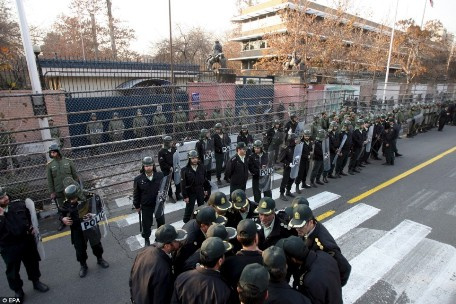Ninth Parliamentary Elections and the Security Challenge

The street protests ensuing the 2009 disputed presidential election Iran, prompted the embassies of many European countries, most important among them Britain, Italy, France and Spain, to take action and support the uprisings by granting asylum to protestors. The behavior of foreign governments and embassies has not changed much since then. Critical remarks by them regarding the 2009 protests are forcefully responded to by Iranian officials. The British embassy, predictably, has played the most conspicuous role, keeping the wounds open by objecting to the treatment of political prisoners, judiciary arbitrations, or the domestic policies of the Iranian government.
Nearly six months ahead of the ninth parliamentary elections, while some European countries have recalled their ambassadors from Tehran and others are passing through a period of hibernation, hardliners in Iran have shed the spotlight on them once more, accusing them of planning new disturbances in the elections.
More than a product of the foreign media, election fever in Iran is mostly the result of diverse political factions trying to up the ante and secure the majority of parliamentary seats in any way possible. The already unethical atmosphere created several months before the elections tempts some to theorize that frequent factional splits and scuffles are the result of foreign embassies’ conspiracy.
On Sunday, attending the annual congregation of Basidji university professors, Editor-in-Chief of Kayhan daily Hossein Shari’atmadari stated that a group of European embassies have mustered their efforts to create security challenges for the country during the ninth parliamentary elections. Sharia’tmadari, once a firm supporter of Mahmoud Ahmadinejad and a champion of unity among the Principlists and purging the government from ‘astray’ figures, has both given a stern warning to the European embassies while forecasting security challenges during the ninth parliamentary poll (the Supreme Leader Ayatollah Khamenei made a similar comment during Eid-e Fetr prayers, giving warning lest elections turn into a security challenge for the Islamic Republic.)
Shari’atmadari, a key political theoretician of the Principlists, also referred to relations between Iranian and foreign figures, claiming that European embassies “have close ties with the ‘Astray Current’ elements and some who claim to be Reformists.” He also stated that the lackluster Reformist camp, knowing that it has no chance to win the elections, counts on creating a schism among the Principlists and in investing in those who have distanced themselves from the Principlist camp. He also added that some articles published in Reformist newspapers “are copied from the BBC and Radio Farda [the Farsi language broadcast of Radio Free Europe] and the only thing changed is the name of the author.”

